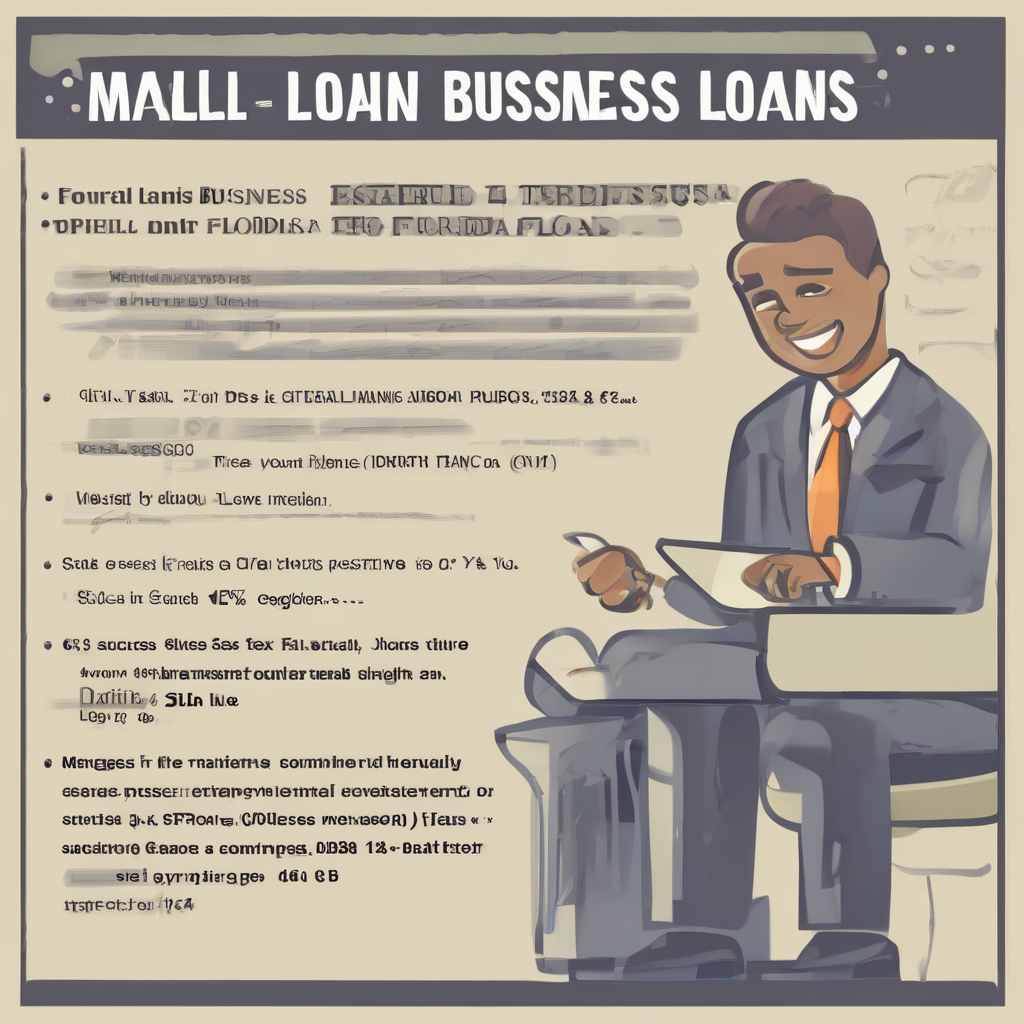Small Business Loans in Florida: Your Guide to Funding Your Dreams

Small Business Loans in Florida: Your Guide to Funding Your Dreams
Starting or growing a small business in Florida is an exciting journey, but securing the right financing can be crucial. From the bustling streets of Miami to the sunny shores of Tampa, entrepreneurs across the Sunshine State require access to capital to fuel their aspirations. This comprehensive guide will equip you with the knowledge you need to navigate the world of small business loans in Florida.
Types of Small Business Loans in Florida
Florida's diverse economic landscape fosters a wide array of loan options catered to specific business needs. Understanding these loan types is the first step toward choosing the right financing solution:
- SBA Loans: Backed by the Small Business Administration (SBA), these loans offer favorable terms and low interest rates, making them highly sought after by small businesses. Popular SBA loan programs include the 7(a) loan, 504 loan, and disaster loans.
- Term Loans: These fixed-term loans provide a set amount of capital with regular repayments. They offer predictable budgeting and are ideal for businesses with established credit histories.
- Lines of Credit: Similar to credit cards, lines of credit offer flexible access to funds as needed. This option is perfect for businesses with fluctuating cash flow requirements.
- Equipment Loans: Specifically designed for purchasing machinery, equipment, and other assets essential for business operations.
- Invoice Factoring: A financing solution where a business sells its invoices to a factoring company at a discount, receiving immediate cash flow. This option is beneficial for companies facing cash flow constraints.
- Microloans: Smaller loans often provided by non-profit organizations or community development financial institutions (CDFIs) to support startups and businesses with limited credit history.
Eligibility Criteria for Small Business Loans
Each loan program comes with its own set of eligibility criteria, ensuring responsible lending practices. While these requirements vary, some common factors include:
- Credit Score: A strong credit history is essential, with minimum scores often ranging from 680 to 700, depending on the lender and loan type.
- Business Revenue and Profitability: Lenders assess the financial performance of your business, looking at revenue streams, profit margins, and cash flow.
- Time in Business: Generally, lenders prefer businesses that have been operating for a minimum period, typically 1-2 years. However, some programs may accommodate newer businesses.
- Collateral: Some loans, such as equipment loans, require collateral, which is an asset that the lender can claim if you default on the loan.
- Industry and Business Plan: Lenders evaluate the industry your business operates in and the feasibility of your business plan.
Finding the Right Small Business Loan in Florida
With a multitude of lenders and loan programs available, finding the perfect match for your business can be overwhelming. Here's a structured approach to streamline your search:
1. Assess Your Needs:
- Determine the purpose of the loan: Expansion, equipment purchase, working capital, etc.
- Calculate the amount of funding required.
- Evaluate your repayment capacity.
2. Explore Funding Sources:
- SBA-Approved Lenders: Access a network of lenders offering SBA-backed loans.
- Commercial Banks: Traditional lenders with established loan programs.
- Credit Unions: Often provide competitive rates and personalized service.
- Online Lenders: Streamlined online platforms offering quick approvals and flexible terms.
- Community Development Financial Institutions (CDFIs): Focus on serving underserved communities and providing loans to businesses that may face challenges securing traditional financing.
3. Compare Loan Offers:
- Interest Rates: The cost of borrowing, expressed as a percentage of the loan amount.
- Fees: Origination fees, closing costs, and other charges associated with the loan.
- Repayment Terms: Loan duration, payment frequency, and grace periods.
- Eligibility Requirements: Ensure your business meets the specific criteria for each loan program.
- Customer Service and Reputation: Research the lender's track record and customer reviews.
Tips for Securing a Small Business Loan
While applying for a small business loan can seem daunting, following these tips can significantly increase your chances of success:
- Build a Strong Credit History: Pay bills on time, reduce credit utilization, and monitor your credit reports regularly.
- Develop a Comprehensive Business Plan: A well-written business plan outlines your business's vision, operations, financial projections, and management team. It serves as a roadmap for your business and provides lenders with a clear understanding of your goals and strategies.
- Organize Financial Documents: Gather essential financial documents like tax returns, bank statements, profit and loss statements, and balance sheets. This will help you showcase your financial health to potential lenders.
- Network with Local Business Organizations: Connect with chambers of commerce, industry associations, and other local business groups. These organizations can provide valuable advice, networking opportunities, and information on loan programs tailored to Florida businesses.
- Consider Alternative Funding Options: If you face challenges securing traditional loans, explore alternative funding sources such as crowdfunding, angel investors, or venture capital.
Resources for Small Business Loans in Florida
Florida offers a wealth of resources to support small businesses in accessing financing:
- Florida Small Business Development Centers (SBDCs): These centers provide free counseling, workshops, and resources to entrepreneurs seeking guidance on business planning, financing, and other aspects of starting and growing a business.
- Florida Department of Economic Opportunity (DEO): This state agency offers various programs and initiatives to support small businesses, including loan programs, grants, and technical assistance.
- Small Business Administration (SBA): The SBA is a federal agency that provides loans, grants, and other assistance to small businesses. It offers a variety of programs specifically designed to meet the needs of Florida entrepreneurs.
- Florida Housing Finance Corporation (FHFC): This agency provides financing for affordable housing and community development projects, which can benefit businesses operating in these sectors.
Conclusion
Navigating the world of small business loans in Florida can be a rewarding experience, leading you to the financial resources needed to achieve your entrepreneurial dreams. With a thorough understanding of loan types, eligibility requirements, and available resources, you can confidently embark on your journey to secure the financing that will propel your Florida business forward.
What's Your Reaction?
















